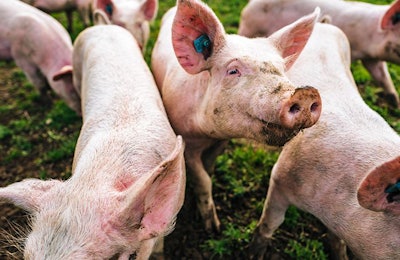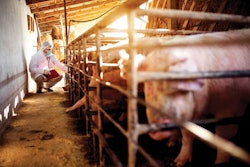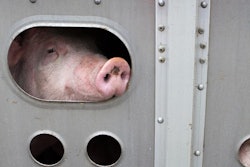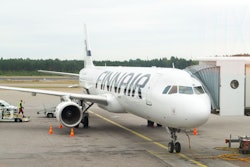
In a further worrying development in the spread in African swine fever (ASF) across the continent of Europe, the Republic of Serbia has officially reported its first cases of the disease to the World Organisation for Animal Health (OIE).
So far, the Republic’s agriculture ministry has confirmed four outbreaks of the disease, all in backyard pig herds and affecting 121 animals, seven of which died. Three of the outbreaks were in the district of the city of Belgrade, and the other was in neighboring Podunavlje.
Up to August 18, there have been 1,111 confirmed outbreaks of ASF among domestic pigs in Europe in 2019, according to the European Commission (EC). From this source, by far worst affected has been Romania (974 outbreaks), followed by Poland (41), Bulgaria (33), Ukraine (32) and Lithuania (15). Other European states with confirmed outbreaks are Italy, Latvia, Serbia and Slovakia.
First ASF cases in Slovakia, new regions of Ukraine, Moldova
The first occurrence of ASF in Slovakia was confirmed at the end of July. Since that time, a further nine outbreaks in domestic pigs have been reported — all in small backyard herds — as well as four cases in wild boar. So far, all the affected animals have been in the Trebisov district of Kosice, a region in the southwest of the country that borders Hungary and Ukraine.
Ukraine is battling the spread of ASF on more than one front. After more than one month, the disease has returned to the southern province of Kherson, affecting a small backyard herd of five animals. There have also been two outbreaks in neighboring Nikolayev province, affecting another small backyard unit, while seven pig carcasses and three live animals found by the side of a road also tested positive for the virus.
ASF was detected after 680 pigs died at a farm in the Lviv region. Culling of the remaining 98,000 animals was ongoing at the time of the official report to the OIE. Source of the infection was unknown, and the last cases of the disease in the area were in November 2017. Located in the west of Ukraine, Lviv shares a border with Poland.
Three pig carcasses that subsequently tested positive for the ASF virus were also found by a river in the southern Ukrainian province of Odessa, according to the veterinary agency’s report to the OIE, one day after a wild boar was found to have the disease in the same province.
The Republic of Moldova’s food safety agency has declared to the OIE that the ASF situation in the northwest of the country has been “resolved.” However, the disease has broken out for the first time in two western districts — Cantemir and Nisporeni — which border Romania, and in Cimislia, which is in the south of the country and shares a border with Ukraine. All nine outbreaks reported so far in domestic pigs in these regions have been in small backyard herds. In the southern district of Cahul, two more backyard herds have been confirmed with ASF since the start of August.
Further outbreaks in Poland, Romania, Russia
In Poland, the number of farms affected by ASF has risen to 34, based on reports received by the OIE from the agriculture ministry up to early August. As in previous cases, the latest nine outbreaks were in the eastern provinces of Warmia-Masuria, Mazovia and Lublin. Affected farms ranged in size from eight to more than 9,400 animals, and more than 13,000 pigs were culled as a result of these most recent outbreaks after 479 of the animals had died.
While the agriculture ministry in Russia has confirmed the first cases of ASF in the country’s Far East region, new outbreaks have also occurred in domestic pigs in the Southern Federal District of Volgograd, and in Nizhne Novgorod in the Volga Federal District. Seven backyard herds were affected, leading to the loss of 170 pigs.
Despite the country’s efforts to control ASF within its borders for more than one year, outbreaks continue to occur in the south and northeast of Romania. In addition to new cases in wild boar, the national veterinary authority has reported to the OIE large numbers of outbreaks between late June and early August. The majority of the outbreaks were in small backyard herds, but the disease was also detected at farms in Dimbovita (with 1,760 pigs), and Braila (3,240). So far this month, almost 23,000 pigs have been lost to ASF through mortality or culling in Romania, based on reports received by the OIE.
Bulgaria: ASF situation could have political impacts
In early August, Bulgaria’s agriculture ministry reported 23 outbreaks of ASF to the OIE. All had been identified between July 19 and August 2, and included seven outbreaks in wild boar involving 22 animals. The cases in domestic pigs involved farms ranging in size from around 8,000 to more than 36,000 animals, as well as eight smaller backyard herds. In total, more than 129,000 pigs were lost to the disease through mortality or culling in these outbreaks alone.
With the virus now confirmed in Vraca, Montana and Vidin city, ASF appears to be spreading across Bulgaria’s northern provinces, which border Romania. Previous cases reported to the OIE were in Pleven, Plovdiv, Ruse and Veliko Tarnovo. Since early July, the authorities have reported a total of 39 ASF outbreaks to the OIE.
Over the past week, news agency Novinite has reported the first case of the disease in a wild boar in Blagoevgrad, which is in the southwest of Bulgaria. In the northern province of Ruse, 70,440 pigs have already been slaughtered as the result of the disease, which has recently been confirmed on a farm with 4,500 pigs, where culling is now underway.
The rapid spread of ASF and culling of pigs could affect the political situation in Bulgaria. Such is the public “uproar” over the ASF situation and culling of pigs that the continued position of the ruling GERB party looks far from certain after the upcoming local elections, according to Radio Bulgaria.
Some farmers affected by ASF are to receive some financial compensation from the government. According to Sofia Globe, the sum of up to BGN300 (US$170) will be paid from September 1 to each farm that has been directed to cull its pigs, and carried out disinfection. This order would have been placed on all backyard units located within 20 kilometers of a commercial farm. The one-off sum will be paid only for units that had 5 or fewer animals for home consumption, and are included on an official list by August 26.
Finland steps up disease prevention measures
Concerned about the global spread of ASF, Finland is taking additional measures to reduce the risk of the disease entering its border. Checks of luggage are being stepped up at Helsinki airport to detect potentially infected meat from wild boar and domestic pigs.
If the disease were to enter Finland, it could cause “tens of millions of euros” in losses to the pork and meat industries, according to Finnish Customs.
ASF in European wild boar: disease returns to southern Ukraine
ASF has returned to Ukraine’s southern province of Odessa after an apparent absence of seven months, according to the official report from the country’s animal health agency to the OIE. One wild boar in a forest tested positive for the virus in early August. Odessa borders Romania and Moldova as well as the Ukrainian province of Nikolayev, where cases of ASF in wild boar have previously been confirmed.
Since the start of August, OIE has received confirmation from other countries about ASF cases in wild boar, including Romania (54 animals), Hungary (49), Latvia (28), Bulgaria (22), Russia (5), Slovakia (4), and Belgium and Moldova (1 each).
This year, there have been 3,967 confirmed outbreaks of ASF among European wild boar up to mid-August, according to the EC. Poland has reported the most outbreaks (1,565), followed by Hungary (847), Belgium (479), Romania (387), Lithuania (333) and Latvia (216). Other European states reporting outbreaks in wild boar during 2019 are Bulgaria, Estonia, Italy, Slovakia and Ukraine.
South Africa: confirmed ASF outbreaks reach 13
Two new ASF outbreaks confirmed in early August have been reported to the OIE by South Africa’s agriculture department, bringing the country’s total since April to 13.
These latest cases — involving 79 animals — belonged to a village herd in Mpumalanga, and a backyard in Gauteng. Previous outbreaks have been reported in both regions, and the disease continues to be confined to areas outside the country’s ASF Control Zone.
This week, a further outbreak of ASF has occurred in Gauteng, according to News 24. Around 1,000 pigs belonging to five owners in the Swainesville area are in the process of being culled. Until the outbreaks are over, pigs in affected provinces cannot be sold at auction, and can only be transported to a registered slaughterhouse with prior authorization from the local state veterinarian, reports the same source.
View our continuing coverage of the African swine fever outbreak.

















